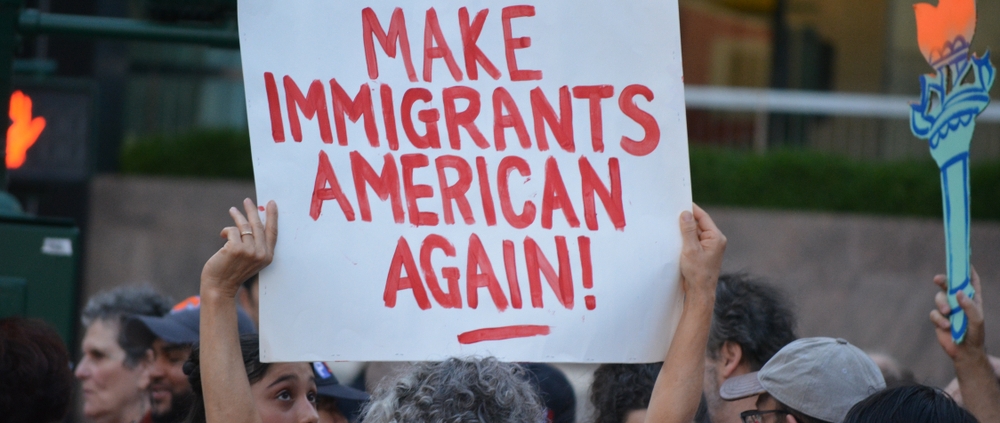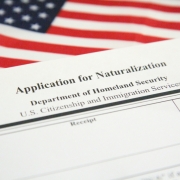Analysis of President Trump’s Policy Proposals on Birthright Citizenship and Mass Deportation of Immigrants
By Brian Figeroux, Esq. | Editorial credit: Christopher Penler / shutterstock.com
President Donald Trump’s proposals to eliminate birthright citizenship and implement mass deportations of undocumented immigrants sparked intense debate over their legality, feasibility, and implications. Birthright citizenship, rooted in the 14th Amendment to the U.S. Constitution, guarantees citizenship to anyone born on U.S. soil, regardless of their parents’ immigration status. Meanwhile, mass deportations of millions of undocumented immigrants present logistical, ethical, and legal challenges.
This article explores the legal pathways and obstacles to implementing these controversial policies, examines historical and contemporary precedents, and analyzes potential consequences on the social and political fabric of the United States. Read more at www.askthelawyer.us. To read the complete analysis in our publication, click here, and on our civil rights blog, click here.
- Birthright Citizenship: Legal Framework and Challenges
Overview of Birthright Citizenship
The principle of birthright citizenship in the United States is codified in the 14th Amendment, which states:
“All persons born or naturalized in the United States, and subject to the jurisdiction thereof, are citizens of the United States and of the State wherein they reside.”
The phrase “subject to the jurisdiction thereof” has been central to debates about whether children born to undocumented immigrants qualify for automatic citizenship. Supporters of birthright citizenship argue that this interpretation was settled by the 1898 Supreme Court case United States v. Wong Kim Ark, which upheld the citizenship of a child born to non-citizen parents who were lawfully present in the U.S.
President Trump’s Proposal
President Trump suggested ending birthright citizenship through an executive order, bypassing Congress. He argued that birthright citizenship incentivizes unauthorized immigration and that the children of undocumented immigrants, often termed “anchor babies,” unfairly benefit from automatic citizenship.
Can Birthright Citizenship Be Revoked?
- Executive Action:
- Legal Feasibility: Ending birthright citizenship via executive order faces significant constitutional hurdles. Constitutional amendments cannot be overridden by executive authority. Courts would likely strike down such an order as unconstitutional.
- Judicial Interpretation: Advocates of this approach argue that the Supreme Court could reinterpret the “subject to the jurisdiction thereof” clause to exclude children of undocumented immigrants. However, this would require a radical departure from established legal precedent.
- Legislative Action:
- Proposed Legislation: Congress could attempt to pass a law redefining the scope of the 14th Amendment’s citizenship clause. Such a law would likely face immediate legal challenges and could be struck down by the courts as unconstitutional.
- Constitutional Amendment: The most definitive way to end birthright citizenship would be through a constitutional amendment. This would require approval by two-thirds of both houses of Congress and ratification by three-fourths of state legislatures, an extremely difficult political feat.
Challenges to Implementation
- Legal Precedent:
- The Wong Kim Ark decision firmly establishes that birthright citizenship applies broadly. Overturning this precedent would require a Supreme Court ruling explicitly narrowing the interpretation of the 14th Amendment.
- Public Opinion and Political Opposition:
- Public support for birthright citizenship remains significant. Attempts to eliminate it would likely face widespread opposition from civil rights groups, immigrant advocacy organizations, and political opponents.
- Practical Implications:
- Eliminating birthright citizenship could create a large population of stateless individuals, as many children born in the U.S. would lack citizenship from any country. This could lead to legal limbo and significant human rights concerns.
- Mass Deportation of Undocumented Immigrants: Legal and Logistical Challenges
President Trump’s Mass Deportation Policy
During his presidency, Trump called for the removal of all undocumented immigrants, estimated at over 11 million people. His administration implemented policies like enhanced immigration enforcement, expanded detention facilities, and increased deportations. However, a full-scale deportation plan poses significant challenges.
Legal Authority for Deportations
- Immigration and Nationality Act (INA):
- The INA provides the legal framework for immigration enforcement, including the removal of individuals who enter the U.S. without authorization or overstay their visas. Deportation requires a formal legal process, including a hearing before an immigration judge.
- Expedited Removal:
- Expedited removal allows certain individuals to be deported without a hearing if they are apprehended near the border and cannot prove lawful entry. Trump sought to expand the use of expedited removal, but this approach has limitations under due process protections.
- Executive Orders and Memoranda:
- The Trump administration issued executive orders prioritizing the deportation of undocumented immigrants, including those without criminal records. However, these orders cannot override due process rights guaranteed by the Constitution.
Challenges to Mass Deportation
- Legal Constraints:
- Due Process: The Fifth Amendment guarantees due process rights to all persons in the U.S., including undocumented immigrants. Mass deportations would require individualized hearings, making rapid removal of millions legally unfeasible.
- Judicial Backlog: Immigration courts are already overwhelmed, with hundreds of thousands of pending cases. Expanding deportations would exacerbate these delays.
- Logistical and Economic Feasibility:
- Cost: Estimates suggest that deporting all undocumented immigrants could cost between $100 billion and $300 billion, considering enforcement, detention, legal processing, and transportation expenses.
- Manpower: Immigration and Customs Enforcement (ICE) and Customs and Border Protection (CBP) lack the resources to carry out mass deportations on such a scale.
- Social and Economic Consequences:
- Impact on Families: Many undocumented immigrants have U.S.-citizen children, leading to family separations and psychological trauma.
- Economic Disruption: Deporting millions would disrupt industries reliant on immigrant labor, such as agriculture, construction, and hospitality.
- Political and Public Challenges
Partisan Divide
Immigration policy has become a deeply polarized issue in American politics. While some Republicans support Trump’s proposals, Democrats and moderate Republicans generally oppose them. Achieving legislative or constitutional changes would require bipartisan support, which is unlikely given the current political climate.
Public Opinion
Polling on immigration issues reveals a divided public:
- Birthright Citizenship: Most Americans support maintaining birthright citizenship, viewing it as a cornerstone of national identity and equality.
- Mass Deportations: Widespread opposition exists to mass deportations, particularly among younger generations and minority groups.
International Relations
Mass deportations and the elimination of birthright citizenship could strain relations with countries of origin for undocumented immigrants. Deporting millions of individuals to countries like Mexico, Guatemala, and El Salvador could overwhelm their social systems and damage diplomatic relations.
- Alternatives and Recommendations
Comprehensive Immigration Reform
Rather than pursuing policies of mass deportation or eliminating birthright citizenship, comprehensive immigration reform offers a more viable solution. Key components could include:
- Pathways to Legalization: Providing a path to citizenship for undocumented immigrants who meet specific criteria, such as long-term residence, employment, and clean criminal records.
- Enhanced Border Security: Balancing enforcement with humane treatment of migrants.
- Modernizing the Immigration System: Streamlining visa processes and reducing court backlogs.
Targeted Enforcement
Focusing enforcement efforts on individuals with serious criminal records rather than implementing blanket deportations would address security concerns without overwhelming the legal system.
Conclusion
President Trump’s proposals to eliminate birthright citizenship and implement mass deportations face insurmountable legal, logistical, and ethical challenges. Both policies would require constitutional, legislative, and procedural changes that are unlikely to succeed given current legal frameworks and political realities.
Rather than pursuing divisive and legally fraught measures, policymakers should focus on comprehensive immigration reform that addresses the root causes of unauthorized immigration while respecting human rights and constitutional protections. Only through balanced and practical solutions can the U.S. effectively manage immigration in a way that upholds its values and national interests.
Immigration law is complex. Have questions about immigration? Ask the Lawyer. Call 855-768-8845 or visit www. askthelawyer.us to schedule an appointment. The lawyer you hire does make a difference!







Leave a Reply
Want to join the discussion?Feel free to contribute!